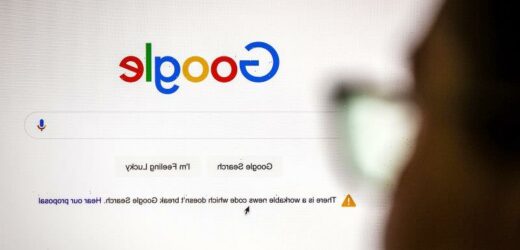Washington: US politicians are questioning Google over how the company’s search engine shows users in certain states inaccurate results about abortion services by diverting them to “fake clinics” that don’t provide the procedure and dissuade people from ending a pregnancy.
In a letter sent on Friday (US time) to Sundar Pichai, the chief executive of Google’s parent company, Alphabet, 20 Democratic members of Congress and Independent senator Bernie Sanders, urged the company to quickly rectify the search accuracy issue, noting it comes as a US Supreme Court decision due later this month could overturn the right to an abortion established in Roe v Wade.
Politicians are challenging Google over its search results for abortion clinics in some US states. Credit:Bloomberg
Politicians cited a recent report that found in states with abortion “trigger laws,” 11 per cent of Google search results for abortion services led users to nonmedical facilities that don’t provide abortion; the result was 37 percent for Google Maps queries. The report by the US-based nonprofit Centre for Countering Digital Hate also found that almost 28 per cent of Google ads that appear at the top of related search-result pages were for antiabortion clinics.
“Directing women towards fake clinics that traffic in misinformation and don’t provide comprehensive health services is dangerous to women’s health and undermines the integrity of Google’s search results,” Democratic lawmakers wrote in the letter that was spearheaded by senator Mark Warner, and congresswoman Elissa Slotkin.
They asked Google to either limit the appearance of fake abortion clinics results when users search for “abortion clinic” or similar terms, or to add more prominent disclaimers on whether a facility provides abortion services; both the lawmakers and the CCDH say existing disclaimers are too small and easily missed.
The request from members of Congress comes after Google pledged in 2014 to remove ads for some “crisis pregnancy centres” that violated the company’s policy against deceptive advertising.
Anti-abortion protesters gather outside the Jackson Women’s Health Organisation clinic in Jackson, Mississippi, the state’s only facility able to provide abortions on demand.Credit:AP
In a statement on Saturday, a Google spokesperson said it continually works to improve its search results to best serve users and said that “any organisation that wants to advertise to people seeking information about abortion services on Google must be certified and show in-ad disclosures that clearly state whether they do or do not offer abortions.”
The landscape for reproductive rights in the United States is expected to shift dramatically in response to the Supreme Court decision, which may come as early as Monday. In addition to the 13 states that have already enacted “trigger laws” that effectively ban abortion the moment Roe is overturned, at least five others are expected to follow suit.
Sixteen states and the District of Columbia have laws explicitly protecting abortion rights at the state level, according to the Guttmacher Institute, a nonprofit research centre based in New York and Washington that supports abortion rights. Remaining states either have no specific law or unenforced bans on the books.
Imran Ahmed, chief executive of the Centre for Countering Digital Hate, told The Washington Post that the draft Supreme Court opinion that leaked in May has stimulated “massive” growth globally in fundraising activity and creativity among groups that seek to undermine fundamental reproductive rights. Similar themes around reproductive rights and abortion misinformation are emerging in Kenya, Latin America and the United Kingdom, he said.
Fighting misinformation through accurate search results is especially critical for Google given its global reach, Ahmed said. Google is far and away the most popular search engine, with more than 90 percent of the global market share, according to the German consumer data analysis company, Statista.
“When Google screws up, it can have an enormous impact on the whole word,” Ahmed said.
How Google’s search algorithm works is a tightly guarded trade secret, but the company says in a public-facing guide on its search engine that Google looks for webpages deemed relevant to a user’s search query and then returns results it believes “are the highest quality and most relevant to the user.” Google said it uses “hundreds of factors” including user location and language to determine “relevancy”.
But Ahmed said the search algorithm can be easily gamed as it tries to determine which webpages are relevant, including by groups that create networks of pages that interlink to each other.
Fake abortion clinics, which often self-style as “crisis pregnancy centres” or “pregnancy resource centres” do not provide abortions, though critics say they try to create a veneer of medical facility by offering pregnancy tests, ultrasounds or testing for sexually-transmitted infections. The American Medical Association’s Journal of Ethics has argued that while “crisis pregnancy centres” are legal, they are unethical “by providing misleading information and causing delays and inequities in access to abortion”.
Instead, the sites for the “crisis pregnancy centres” actively dissuade patients from choosing abortion, often through misinformation. Among the false claims made by fake clinics cited in the CCDH report are that abortions will make a pregnant person infertile or that suicidal impulses are “common” after an abortion.
Ahmed stressed the relevant criticism of fake abortion clinics is not their ideology, but the deceptive tactics they use to induce people to behave in a way they want.
“People have a right to hold an opinion on abortion,” he said. “But it’s [their] use of deception that makes it so malignant.”
With disinformation and misinformation having direct repercussions on people’s personal health, Ahmed said it’s crucial for major technology platforms to act responsibly – and for policymakers to hold them to account.
“This is just another example of how hate and disinformation actors can weaponise digital platforms to cause real-world harm to people,” he said.
The Washington Post
Most Viewed in World
From our partners
Source: Read Full Article




